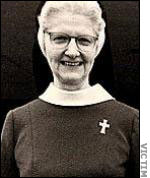By Seamus McGraw
April 26, 2006
TOLEDO, Ohio (Crime Libarary) — It was cold that morning in April, 1980, but it always is on Holy Saturday, that twilight in the Roman Catholic calendar between the most solemn of days, Good Friday, and Easter, the most joyous, the time when Catholics, according to their creed, believe to Jesus descended into Hell before rising. As was her practice, Sister Madelyn Mary Gordon, the organist for the chapel at Mercy Hospital arrived early at the sacristy to prepare for Mass.
Instead, she was met by an image that was so horrifying and macabre that at first as she would later say, she believed it had to have been some sick prank played with one of the mannequins the hospital used to help train its workers. It was no prank.
There on the marble floor, laid out with almost ritualistic precision was the body of another nun, Sister Margaret Ann Pahl. Authorities would later determine that she had been strangled, her killer exerting enough pressure to break tiny bones in her neck. Her panties were dragged down to her ankles, but her killer had apparently taken great care to pose her body. Her arms and legs were laid straight; her head was in perfect alignment, and near her body was a blood-stained altar cloth. Through that makeshift shroud, authorities would later conclude, her killer had stabbed her 31 times. But most chilling of all was the fact that nine of those wounds, surrounding her heart, had formed a kind of cross.
 |
| Sister Margaret Pahl |
It was, by all appearances, an almost ritualized murder, shocking enough in its gruesome detail, but made even more horrific by the fact the victim was, by all accounts, a devout and dedicated woman who had devoted her life to God and spent her days ministering to the sick.
The murder of Sister Margaret was perhaps one of the most shocking crimes in recent Ohio history. And yet, despite all the media attention paid to it, despite the efforts of the Toledo police, it remained a mystery for almost a generation. Though even at the beginning, authorities had suspected that perhaps the hospital's chaplain, Father Gerald Robinson, might have known more about the case that he was saying, there was at the time, too little evidence to pursue him, and so, as the years passed, the case went cold.
It might have remained that way, a bizarre and unsolved mystery. But in late 2003, a woman, who by then was in her forties, delivered a four-page letter to the Toledo Diocese. In it, she outline a series of graphic allegations, involving sexual abuse, Satanic rituals, and, as it turned out, Father Robinson.
Next Page
Message Boards
See Feature Story on Gerald Robinson Case
See Court TV Coverage of Trial
For more daily crime news
